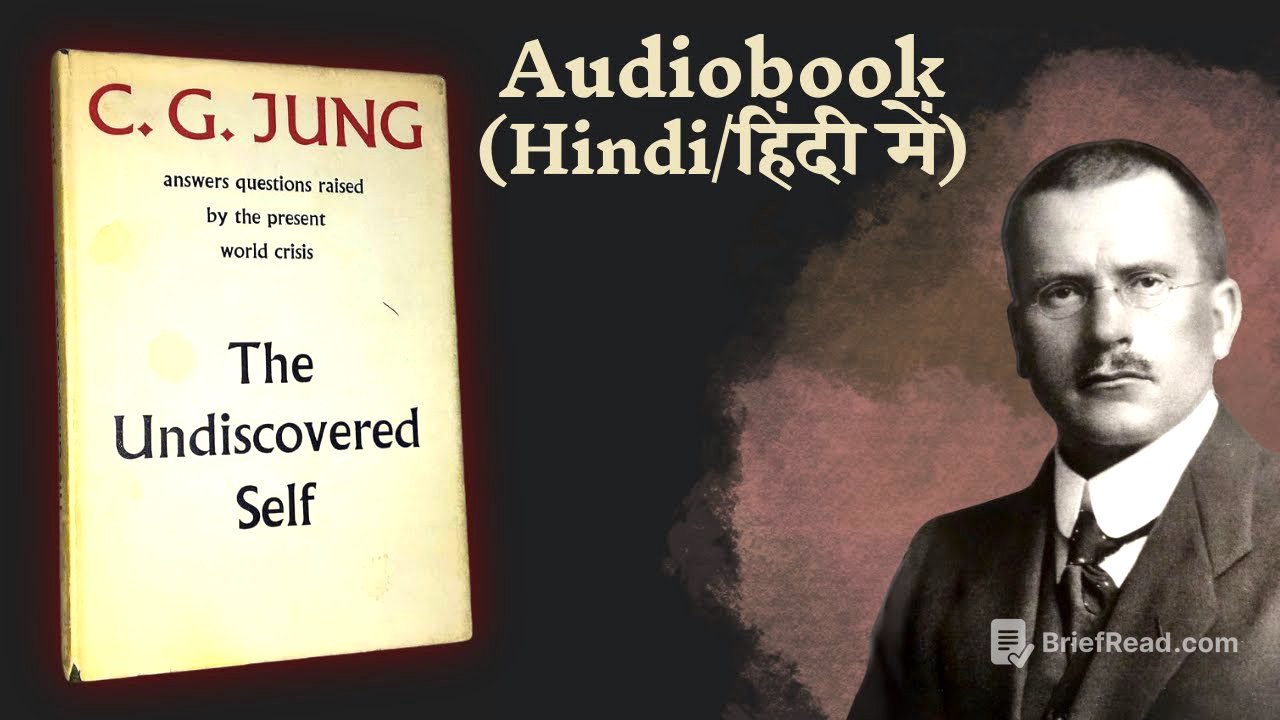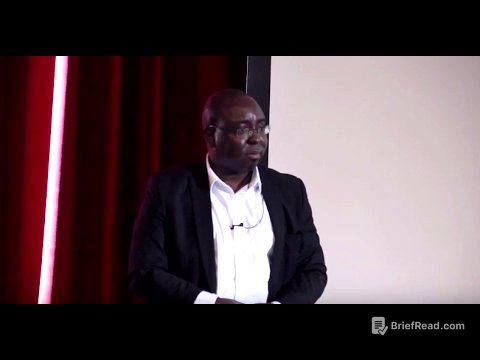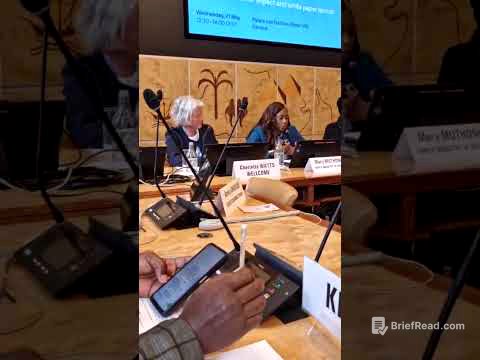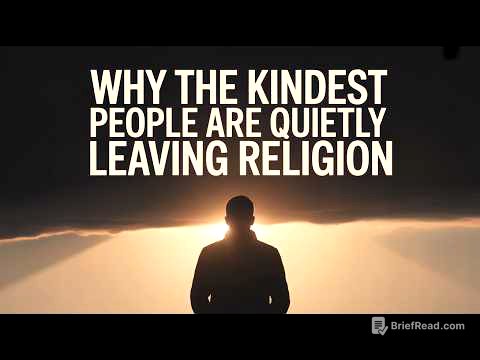TLDR;
This video summarizes Carl Jung's "The Undiscovered Self," a warning to modern individuals in an increasingly political and scientific society. Jung emphasizes the importance of self-understanding as a defense against mass movements and collective ideologies. The book explores the true self, hidden under external pressures, and advocates for deep self-awareness. It also discusses the role of religion as a counterbalance to mass-mindedness, the individual's understanding of themselves, and the philosophical and psychological approaches to life, ultimately stressing the significance of self-knowledge for personal and societal balance.
- Importance of self-understanding
- Role of religion as a counterbalance to mass-mindedness
- Philosophical and psychological approaches to life
- Significance of self-knowledge for personal and societal balance
Intro [0:00]
Carl Jung's "The Undiscovered Self" serves as a warning to modern individuals, particularly in societies becoming overly political or scientific, causing people to lose sight of their true identities. Jung posits that understanding one's inner truth is crucial to resist manipulation by mass movements, propaganda, and collective ideologies. He views psychological awareness as essential for both personal growth and maintaining societal equilibrium. The book explores how the true self is often concealed by external pressures, advocating for deep, unmasked self-understanding. Jung presents self-knowledge as a responsibility, viewing the book as an inner mirror for understanding both oneself and the world.
The Plight of the Individual in Modern Society [1:49]
People are increasingly anxious about the future due to physical, political, economic, and spiritual distress in the world, leading to dreams and fears about the world's end. The threat of hydrogen bombs and potential destruction looms large, causing widespread anxiety. Groups with extreme ideas are restrained only by a small layer of stability, which varies by country based on the nature and education system. Deep thinking is not a common human trait, and strong emotions can lead to a group mental state resembling a psychological illness. In such states, normal rules are hidden, and individuals may not even realize their thoughts and behaviors are influenced by the crowd. Self-knowledge is often limited to understanding the conscious ego, but the unconscious part remains largely unknown. People measure their self-knowledge by how others perceive them, unaware of hidden psychological facts.
Religion as the Counterbalance to Mass-Mindedness [24:07]
States often try to undermine religion to ensure individuals depend solely on the state. Religion, with its irrational experiences and focus on inner attitudes, provides a space for comparison and independent judgment. It acts as a backup against the forces of conformity. Without religion, statistics become the sole authority, rendering judgment and decision-making useless, turning individuals into mere statistics. Religion teaches a different authority, dependence on God, making claims bigger than the world's. When religion compromises with the state, it becomes a creed, a collective belief, rather than a personal relationship with the divine. True religion involves a personal connection with God, from which ethics emerge. Without personal responsibility before God, morality becomes ordinary.
The Position of the West on the Question of Religion [41:33]
The West, with its heritage of Roman law, Christian ethics, and the idea of inalienable human rights, faces the challenge of stopping the development of socialist dictatorships. Blaming socialist dictatorship is not enough, because any economic system can function if people are willing to sacrifice for it. The real danger to such states is military attack from outside, but this risk is decreasing as dictator states increase their war power and the West hesitates to attack. The only remaining option is the breaking of power from within, which must happen naturally due to strong control systems and the risk of nationalist reactions. The West lacks the means to impact its rivals, while absolute states have fanatical missionaries and groups of believers undermining Western governments. The West must address the threat from the East, not just through politics and economics, but by spreading a faith that is not materialistic.
The Individual’s Understanding of Himself [55:23]
Humans often undervalue themselves due to a lack of certainty about their nature, considering themselves a puzzle. They differentiate themselves from animals based on anatomy and physiology but struggle to understand their conscious thinking and language. The psyche, the most important element of human existence, remains an unsolved puzzle behind major historical changes. While there is hope for new discoveries in nature, people hesitate to explore the psyche. Psychology, the youngest science, is still developing and freeing itself from mythological ideas. The connection between the brain and the psyche is complex, and people often ignore the results of parapsychology. A psychology that ignores the unconscious or parapsychology is insufficient.
The Philosophical and the Psychological Approach to Life [1:34:11]
Our thinking often lags behind the changing world, and there's no need to change it if it's working properly. Philosophy is no longer a way of life but an academic subject. Modern scientific psychology, while helpful, can also be abstract and boring. Medical psychology, however, is different because the patient's individuality and situation are so strong that the doctor cannot ignore them. The doctor must face uncertainty and apply general principles, but these principles may not explain the actual facts. As understanding deepens, the general principles mean less. The deeper the understanding, the more it moves away from knowledge.
Self-Knowledge [1:58:02]
Self-knowledge is achieved when a person is ready to be honest in seeing and understanding themselves, gaining both important insights and psychological benefits. It involves admitting one's importance and focusing on oneself, laying the foundation for consciousness. This does not mean the unconscious is God, but rather a medium to reach the source of experience, whether one believes in God or not. Religious experiences, like Paul's conversion, are miraculous. The question of whether these experiences come from God or gods is useless because the person becomes so attached to the experience that they become philosophical.
The Meaning of Self-Knowledge [2:22:05]
Self-knowledge involves exploring one's inner world and psyche, which is often ignored until something goes wrong. Psychologists need patience and cannot rely on theories or act as advisors. The situation is helpless, and people avoid deeply examining their inner problems. The journey of self-knowledge is personal but also influenced by the unconscious, which balances thinking and anticipates future changes. Modern art, for example, breaks old ideas and changes the way of thinking, reflecting a prophetic spirit moving towards subjective chaos. Great art draws power from myth and symbolization, expressing the human spirit. The development of modern art reflects a breaking of old forms, showing a mood felt everywhere in politics, society, and philosophy.








